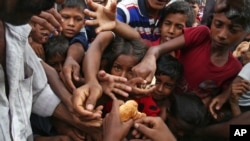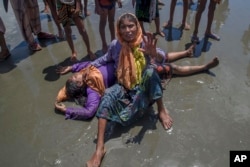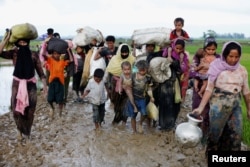Trucks carrying emergency supplies to children affected by the Rohingya refugee crisis are making their way to Bangladesh, where hundreds of thousands of members of Myanmar's Rohingya community have fled for safety, the U.N.’s children’s agency said Thursday.
Up to 400,000 Rohingya so far have fled Myanmar for Bangladesh and, according to UNICEF, about 60 percent of them are children.
“There are acute shortages of everything, most critically shelter, food and clean water,” said Edouard Beigbeder, UNICEF’s Representative in Bangladesh. “Conditions on the ground place children at risk of high risk of water-borne disease. We have a monumental task ahead of us to protect these extremely vulnerable children.”
The aid sent by UNICEF includes water, sanitation supplies, clothing and other essentials, the agency said, with more supplies scheduled to arrive throughout the coming weeks.
UN chief speaks of ethnic cleansing
The aid announcement comes a day after U.N. Secretary-General António Guterres described the situation as tantamount to the ethnic cleansing of the Rohingya community.
"When one-third of the Rohingya population has got to flee the country, can you find a better word to describe it?" Guterres responded when he was asked specifically if the term ethnic cleansing applied to the plight of the Rohingyas, most of whom are Muslims, in the overwhelmingly Buddhist Asian nation.
"I call on Myanmar authorities to suspend military action, end the violence, uphold the rule of law and recognize the right of return of all those who had to leave the country," Guterres said at United Nations headquarters in New York. "Muslims of Rakhine State must be granted nationality or, at least for now, a legal status so they can lead a normal life."
With concern growing worldwide about the situation in Myanmar's western Rakhine State, the country's de-facto leader, Aung San Suu Kyi, has canceled her original plans to travel to New York for annual U.N. General Assembly meeting beginning next week.
The Nobel Peace Prize laureate, revered for her political campaign against the military junta that formerly ruled her homeland (formerly Burma) has been criticized for a failure to do more to stop the current round of violence.
Government officials in Myanmar consider almost all of Rohingyas illegal immigrants from Bangladesh, even those who have lived in the country for generations. Violence involving the Rohingyas has been going on for a long time, but it grew to a crisis last month.
Authorities in Myanmar said a group of Rohingya militants attacked dozens of police posts and an army base on August 25, reputedly in an attempt to retaliate against persecution targeting them.
About 400 people were killed in subsequent clashes, many of which were deliberate attacks by members of Myanmar's security forces, according to members of the Rohingya minority. The government said its forces were engaged in a military counteroffensive against alleged "terrorists" involved in the attacks three weeks ago.
The violence has spurred an exodus among Rohingyas living in Myanmar, a community of about one million people. Nearly 400,000 have fled toward Bangladesh, which borders Rakhine State, where almost all Rohingyas live.
‘Defining moment’
Aung San Suu Kyi, who was held under house arrest for years by Burma's former military rulers, has been known as an icon of democracy, but her recent comments have been seen by some as apparent indifference to the plight of her country's minority Muslims.
She has dismissed many accounts of the events in Rakhine State as “fake information” designed to promote the interests of “terrorists," and that stance has drawn scorn from other governments and human-rights activists, including a number of her fellow Nobel Peace laureates.
U.S. Secretary of State Rex Tillerson on Thursday called the Rohingya situation a “defining moment” for Myanmar’s fledgling democracy and said the violence against the Rohingya people “must stop.”
“We need to support Aung San Suu Kyi and her leadership, but also be very clear, unequivocal to the military power sharing in that government, that this is unacceptable,” he said.
U.S. Senate Majority Leader Mitch McConnell said he spoke Wednesday night with Aung San Suu Kyi, and she explained that “by law, her civilian government has virtually no authority over the Burmese military.”
“According to the Burmese constitution, the army is essentially autonomous and has control on the ground of the Rohingya situation,” McConnell said. “Unfounded criticism of [Aung San] Suu Kyi exaggerates her ability to command the military, which the Burmese constitution does not actually allow her to do.”
McConnell said she is working to improve access for humanitarian aid, and Aung San Suu Kyi agrees there is a “pressing need to pursue peace and reconciliation among the communities in Rakhine state.”
A forthcoming General Assembly session is scheduled to review the situation in Myanmar during two special meetings in the coming days and weeks. Many diplomats will attend a session hosted by the Organization of Islamic Cooperation (OIC) and chaired by Turkey, and a second, smaller group of foreign ministers will convene at the invitation of their British counterpart.
A spokesman for the Myanmar government, Zaw Htay, confirmed Wednesday that Aung San Suu Kyi will not travel to New York but will remain in Myanmar to deal with the ongoing security situation.
The spokesman said the Nobel laureate, who serves both as Myanmar's foreign minister and as a "special adviser" to the government, would deliver a televised address next week to "speak for national reconciliation and peace." The speech will be seen as her first detailed public comment about the crisis involving the Rohingya minority.







